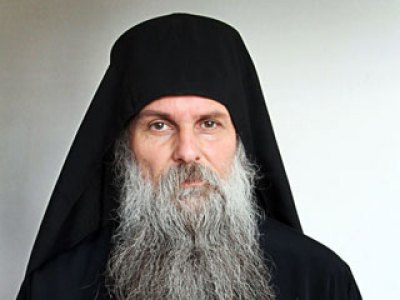



| Thursday, 13 June 2013. | |
| Presentation of a book “Historiography of the Holocaust in Yugoslavia” by Bishop of Lipljan Jovan Culibrk at the Holocaust Memorial Synagogue of the Russian Jewish Congress | |
| + larger fontnormal font- Smaller font |
 The Public Chamber Commission on Interethnic Relations and Freedom of Conscience of the Russian Federation, the Russian Jewish Congress, Holocaust Centre and Fund co-organized a public class by Bishop of Lipljan Jovan (Culibrk) in Moscow, on 13 June 2013, on the occasion of launch of a book "Historiography of the Holocaust in Yugoslavia". The public class was held at the Holocaust Memorial Synagogue of the Russian Jewish Congress in the presence of the diplomatic representatives of Serbia, Ukraine and Latvia, social and governmental structures and the Russian Orthodox Church. President of the Russian Jewish Congress Yuri Issakovich Kaner and Chairperson of the Holocaust Fund Alla Gerber were also in attendance. The Public Chamber Commission on Interethnic Relations and Freedom of Conscience of the Russian Federation, the Russian Jewish Congress, Holocaust Centre and Fund co-organized a public class by Bishop of Lipljan Jovan (Culibrk) in Moscow, on 13 June 2013, on the occasion of launch of a book "Historiography of the Holocaust in Yugoslavia". The public class was held at the Holocaust Memorial Synagogue of the Russian Jewish Congress in the presence of the diplomatic representatives of Serbia, Ukraine and Latvia, social and governmental structures and the Russian Orthodox Church. President of the Russian Jewish Congress Yuri Issakovich Kaner and Chairperson of the Holocaust Fund Alla Gerber were also in attendance.
The public class was opened by the Chairman of the Public Chamber Commission on Interethnic Relations and Freedom of Conscience of the Russian Federation Nikolai Svanidze, who said that Bishop Jovan's work had been noted for a long time as very productive in the inter-faith dialogue between the Serbian Orthodox Church and Judaism as well as between the Jewish and Serbian peoples. As he put it, the book "Historiography of the Holocaust in Yugoslavia' was a scientific work, a kind of an essay book on the suffering of Jews but also of a great and freedom-loving people such as the Serbian people. He said that Serbs and Jews stood shoulder to shoulder not only in fighting Fascism and Nazism but also in the death camps throughout Hitler's Europe. He spoke of the many victims of the Nazi camp of Jasenovac in the so-called Independent State of Croatia, pointing out that this was the only camp in Europe, where more Serbs than Jews were exterminated. He concluded by saying that the Jews remembered their victims because one could not understand the grief of another people without understanding its own grief first. Bishop Jovan explained that the book "Historiography of the Holocaust in Yugoslavia" consisted of two parts containing three papers with plenty of historical facts, definition of the Holocaust and a clear distinction being drawn between the Holocaust and genocide. He indicated that the book abounded in historical facts about the suffering of the Serbs and non-Serbs and members of other ethnic minorities living in Yugoslavia at the time. Speaking about the understanding between Serbs and Jews, he said that the Jews were very fond of Serbs. Looking back on the time he spent in Israel, he singled out the activities of the local association called "Jews Fighting for Serbia". He pointed out the well-known fact that Russian Jews worldwide were predominantly pro-Serb. When referring to the suffering of people in World War II because of their belonging to a certain ethnic group, he also compared it to the suffering of Serbs in Kosovo and Metohija, in Europe today, for the very same reasons. He reminded that what was going on in Kosovo was the struggle to survive, and that what happened there was genocide of sorts perpetrated against the Serbian people. Ambassador Dr Slavenko Terzic said that the publication of this book was very important as a remembrance of the victims and as a warning that the evil done in WWII must not be forgotten. He pointed to the trends observed, unfortunately, in the present-day world towards revising history and revenge, and that in order to put a stop to such negative tendencies, the book "Historiography of the Holocaust in Yugoslavia' contributed to preserve historical memory and, thus, prevent the horror of the Holocaust from being repeated ever again. In his remarks Ambassador Terzic mentioned the plight of Kosovo Jews who were also imprisoned in the many camps in Yugoslavia and who no longer lived in Kosovo. Speaking about the commitment to remembrance of Holocaust victims in the world, Ambassador Terzic highlighted the great role played and still played by the Jews, saying that the other nations should be more committed to remembrance of their own victims so as to avoid history being repeated in its most brutal way. |